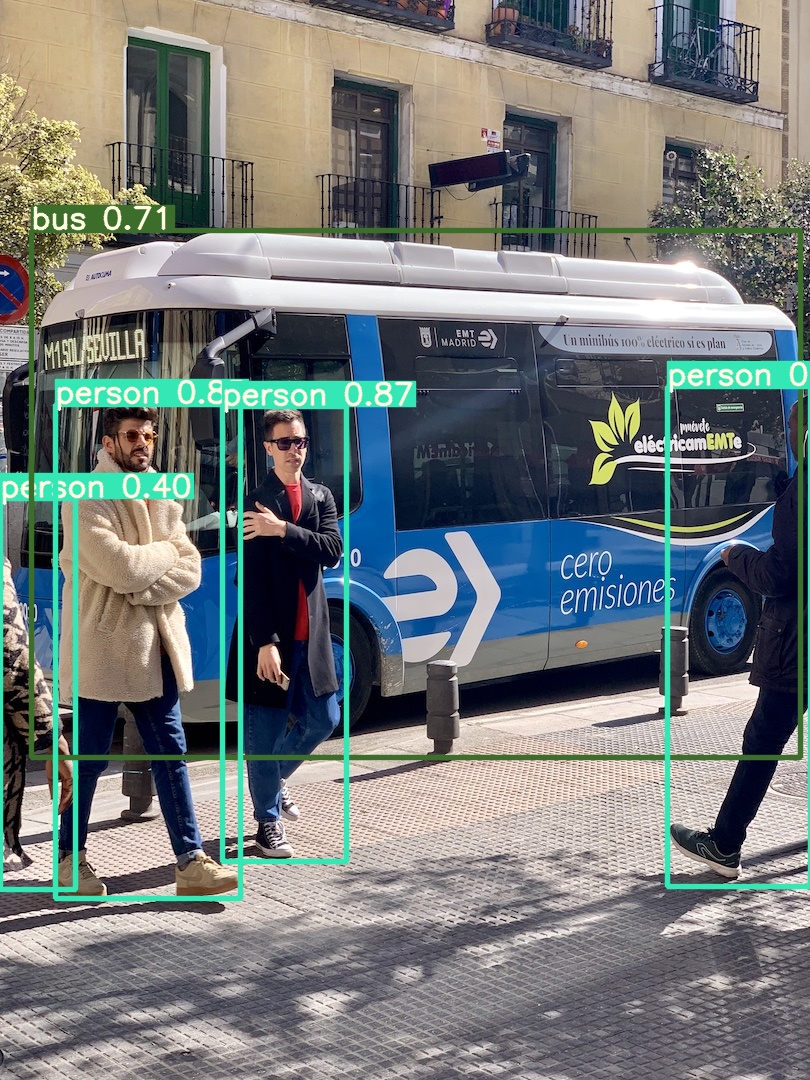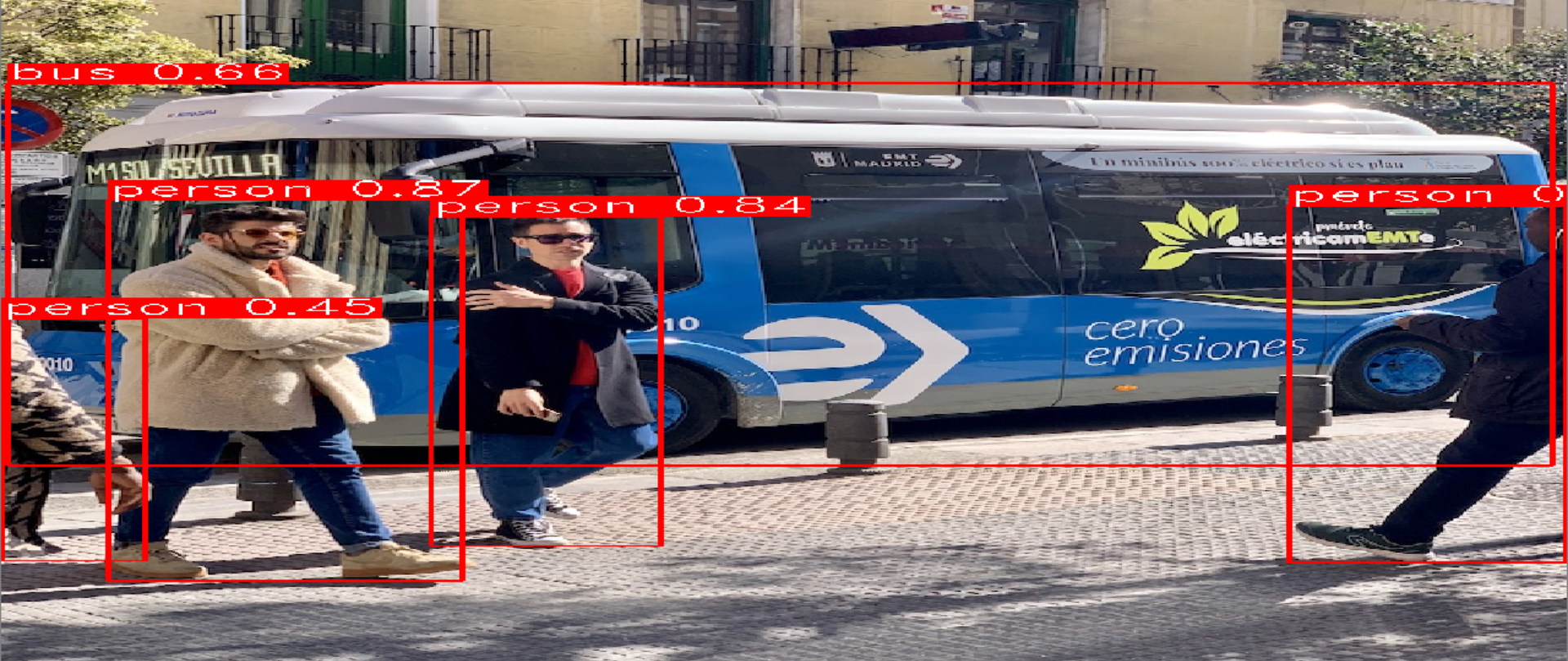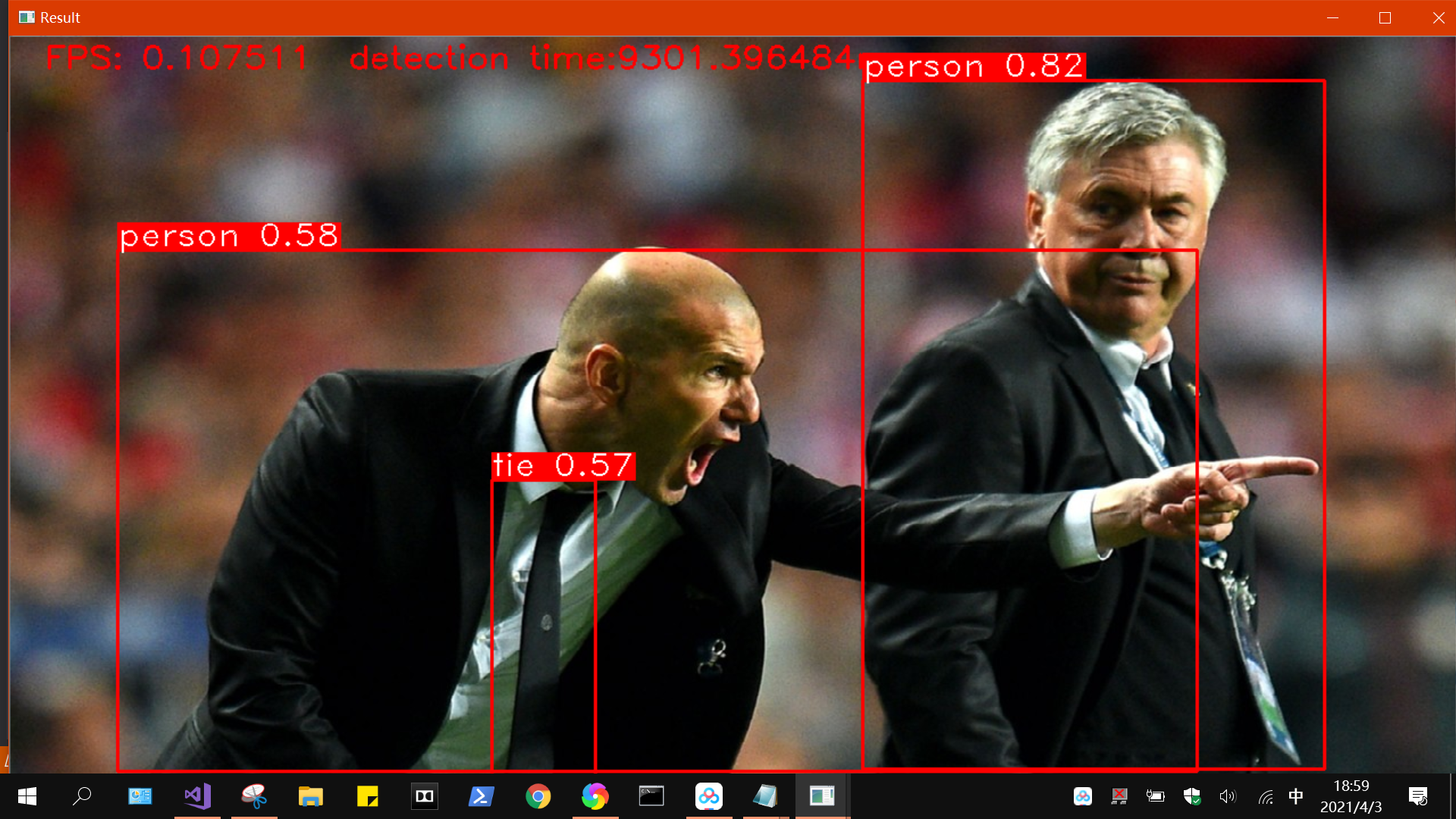目录
- 一、环境配置
- 二、.torchscript.pt版本模型导出
- 三、C++版本yolov5.4实现
- 四、问题记录
一、环境配置
- win10
- vs2017
- libtorch-win-shared-with-deps-debug-1.8.1+cpu
- opencv349
由于yolov5代码,作者还在更新(写这篇博客的时候,最新是5.4),模型结构可能会有改变,所以咱们使用的libtorch必须满足其要求,最好是一致。我这里提供本博客采用的yolov5版本python源码。
百度云网盘分享:

1 链接:https://pan.baidu.com/s/1VVns4hzJdDN0hFNtSnUZ2w 2 提取码:6c1p 3 复制这段内容后打开百度网盘手机App,操作更方便哦
在源码中的requirments.txt中要求依赖库版本如下;在c++环境中,咱们这里用的libtorch1.8.1(今天我也测试了环境:libtorch-win-shared-with-deps-1.7.1+cu110,也能够正常检测,和本博客最终结果一致);同时用opencv&c++作图像处理,不需要c++版本torchvision:
1 # pip install -r requirements.txt 2 3 # base ---------------------------------------- 4 matplotlib>=3.2.2 5 numpy>=1.18.5 6 opencv-python>=4.1.2 7 Pillow 8 PyYAML>=5.3.1 9 scipy>=1.4.1 10 torch>=1.7.0 11 torchvision>=0.8.1
# 以下内容神略
为了便于调试,我这里下载的是debug版本libtorch,而且是cpu版本,代码调好后,转GPU也很简单吧。opencv版本其实随意,opencv3++就行。
二、.torchscript.pt版本模型导出
打开yolov5.4源码目录下models文件夹,编辑export.py脚本,如下,将58行注释,新增59行(GPU版本还需要修改一些内容,GPU版本后续更新,这篇博客只管CPU版本)
1 """Exports a YOLOv5 *.pt model to ONNX and TorchScript formats 2 3 Usage: 4 $ export PYTHONPATH="$PWD" && python models/export.py --weights ./weights/yolov5s.pt --img 640 --batch 1 5 """ 6 7 import argparse 8 import sys 9 import time 10 11 sys.path.append('./') # to run '$ python *.py' files in subdirectories 12 13 import torch 14 import torch.nn as nn 15 16 import models 17 from models.experimental import attempt_load 18 from utils.activations import Hardswish, SiLU 19 from utils.general import set_logging, check_img_size 20 from utils.torch_utils import select_device 21 22 if __name__ == '__main__': 23 parser = argparse.ArgumentParser() 24 parser.add_argument('--weights', type=str, default='./yolov5s.pt', help='weights path') # from yolov5/models/ 25 parser.add_argument('--img-size', nargs='+', type=int, default=[640, 640], help='image size') # height, width 26 parser.add_argument('--batch-size', type=int, default=1, help='batch size') 27 parser.add_argument('--dynamic', action='store_true', help='dynamic ONNX axes') 28 parser.add_argument('--grid', action='store_true', help='export Detect() layer grid') 29 parser.add_argument('--device', default='cpu', help='cuda device, i.e. 0 or 0,1,2,3 or cpu') 30 opt = parser.parse_args() 31 opt.img_size *= 2 if len(opt.img_size) == 1 else 1 # expand 32 print(opt) 33 set_logging() 34 t = time.time() 35 36 # Load PyTorch model 37 device = select_device(opt.device) 38 model = attempt_load(opt.weights, map_location=device) # load FP32 model 39 labels = model.names 40 41 # Checks 42 gs = int(max(model.stride)) # grid size (max stride) 43 opt.img_size = [check_img_size(x, gs) for x in opt.img_size] # verify img_size are gs-multiples 44 45 # Input 46 img = torch.zeros(opt.batch_size, 3, *opt.img_size).to(device) # image size(1,3,320,192) iDetection 47 48 # Update model 49 for k, m in model.named_modules(): 50 m._non_persistent_buffers_set = set() # pytorch 1.6.0 compatibility 51 if isinstance(m, models.common.Conv): # assign export-friendly activations 52 if isinstance(m.act, nn.Hardswish): 53 m.act = Hardswish() 54 elif isinstance(m.act, nn.SiLU): 55 m.act = SiLU() 56 # elif isinstance(m, models.yolo.Detect): 57 # m.forward = m.forward_export # assign forward (optional) 58 #model.model[-1].export = not opt.grid # set Detect() layer grid export 59 model.model[-1].export = False 60 y = model(img) # dry run 61 62 # TorchScript export 63 try: 64 print(' Starting TorchScript export with torch %s...' % torch.__version__) 65 f = opt.weights.replace('.pt', '.torchscript.pt') # filename 66 ts = torch.jit.trace(model, img) 67 ts.save(f) 68 print('TorchScript export success, saved as %s' % f) 69 except Exception as e: 70 print('TorchScript export failure: %s' % e) 71 # 以下代码省略,无需求改 72 ......
接着在conda环境激活yolov5.4的虚拟环境,执行下面脚本:
(提示:如何配置yolov5.4环境?参考我这篇Win10环境下YOLO5 快速配置与测试:https://www.cnblogs.com/winslam/p/13474330.html)
python models/export.py --weights ./weights/yolov5s.pt --img 640 --batch 1
错误解决:1、bash窗口可能提示 not module utils;这是因为没有将源码根目录添加进环境变量,linux下执行以下命令就行
export PYTHONPATH="$PWD"
win下,我建议直接用pycharm打开yolov5.4工程,在ide中去执行export.py就行,如果你没有下载好yolovs.pt,他会自动下载,下载链接会打印在控制台,如下,如果下不动,可以尝试复制链接到迅雷
Downloading https://github.com/ultralytics/yolov5/releases/download/v4.0/yolov5s.pt to yolov5s.pt...
执行export.py后出现如下警告:
1 D:yolov5-0327modelsyolo.py:50: TracerWarning: Converting a tensor to a Python boolean might cause the trace to be incorrect. We can't record the data flow of Python values, so this value will be treated as a constant in the future. This means that the trace might not generalize to other inputs! 2 if self.grid[i].shape[2:4] != x[i].shape[2:4]: 3 D:Program FilesAnacondaenvsyolov5libsite-packages orchjit\_trace.py:934: TracerWarning: Encountering a list at the output of the tracer might cause the trace to be incorrect, this is only valid if the container structure does not change based on the module's inputs. Consider using a constant container instead (e.g. for `list`, use a `tuple` instead. for `dict`, use a `NamedTuple` instead). If you absolutely need this and know the side effects, pass strict=False to trace() to allow this behavior. 4 module._c._create_method_from_trace( 5 TorchScript export success, saved as ./yolov5s.torchscript.pt 6 ONNX export failure: No module named 'onnx' 7 CoreML export failure: No module named 'coremltools' 8 9 Export complete (10.94s). Visualize with https://github.com/lutzroeder/netron.
警告内容以后分析,不影响部署
三、C++版本yolov5.4实现
libtorch在vs环境中配置(在项目属性中设置下面加粗项目):
include:
D:libtorch-win-shared-with-deps-debug-1.8.1+cpulibtorchinclude
D:libtorch-win-shared-with-deps-debug-1.8.1+cpulibtorchinclude orchcsrcapiinclude
lib:
D:libtorch-win-shared-with-deps-debug-1.8.1+cpulibtorchlib
依赖库(你可能用的更新的libtorch,所以具体lib目录下所有.lib文件都要自己贴到连接器-附加依赖中):
asmjit.lib c10.lib c10d.lib c10_cuda.lib caffe2_detectron_ops_gpu.lib caffe2_module_test_dynamic.lib caffe2_nvrtc.lib clog.lib cpuinfo.lib dnnl.lib fbgemm.lib fbjni.lib gloo.lib gloo_cuda.lib libprotobuf-lite.lib libprotobuf.lib libprotoc.lib mkldnn.lib pthreadpool.lib pytorch_jni.lib torch.lib torch_cpu.lib torch_cuda.lib XNNPACK.lib
环境变量(需要重启):
D:libtorch-win-shared-with-deps-debug-1.8.1+cpulibtorchlib
配置好之后,vs2017 设置为debug X64模式,下面是yolov5.4版本c++代码
输入是:
- 上述转好的.torchscript.pt格式的模型文件
- coco.names
- 一张图

1 #include <torch/script.h> 2 #include <torch/torch.h> 3 #include<opencv2/opencv.hpp> 4 #include <iostream> 5 6 7 std::vector<std::string> LoadNames(const std::string& path) 8 { 9 // load class names 10 std::vector<std::string> class_names; 11 std::ifstream infile(path); 12 if (infile.is_open()) { 13 std::string line; 14 while (std::getline(infile, line)) { 15 class_names.emplace_back(line); 16 } 17 infile.close(); 18 } 19 else { 20 std::cerr << "Error loading the class names! "; 21 } 22 23 return class_names; 24 } 25 26 std::vector<float> LetterboxImage(const cv::Mat& src, cv::Mat& dst, const cv::Size& out_size) 27 { 28 auto in_h = static_cast<float>(src.rows); 29 auto in_w = static_cast<float>(src.cols); 30 float out_h = out_size.height; 31 float out_w = out_size.width; 32 33 float scale = std::min(out_w / in_w, out_h / in_h); 34 35 int mid_h = static_cast<int>(in_h * scale); 36 int mid_w = static_cast<int>(in_w * scale); 37 38 cv::resize(src, dst, cv::Size(mid_w, mid_h)); 39 40 int top = (static_cast<int>(out_h) - mid_h) / 2; 41 int down = (static_cast<int>(out_h) - mid_h + 1) / 2; 42 int left = (static_cast<int>(out_w) - mid_w) / 2; 43 int right = (static_cast<int>(out_w) - mid_w + 1) / 2; 44 45 cv::copyMakeBorder(dst, dst, top, down, left, right, cv::BORDER_CONSTANT, cv::Scalar(114, 114, 114)); 46 47 std::vector<float> pad_info{ static_cast<float>(left), static_cast<float>(top), scale }; 48 return pad_info; 49 } 50 51 enum Det 52 { 53 tl_x = 0, 54 tl_y = 1, 55 br_x = 2, 56 br_y = 3, 57 score = 4, 58 class_idx = 5 59 }; 60 61 struct Detection 62 { 63 cv::Rect bbox; 64 float score; 65 int class_idx; 66 }; 67 68 void Tensor2Detection(const at::TensorAccessor<float, 2>& offset_boxes, 69 const at::TensorAccessor<float, 2>& det, 70 std::vector<cv::Rect>& offset_box_vec, 71 std::vector<float>& score_vec) 72 { 73 74 for (int i = 0; i < offset_boxes.size(0); i++) { 75 offset_box_vec.emplace_back( 76 cv::Rect(cv::Point(offset_boxes[i][Det::tl_x], offset_boxes[i][Det::tl_y]), 77 cv::Point(offset_boxes[i][Det::br_x], offset_boxes[i][Det::br_y])) 78 ); 79 score_vec.emplace_back(det[i][Det::score]); 80 } 81 } 82 83 void ScaleCoordinates(std::vector<Detection>& data, float pad_w, float pad_h, 84 float scale, const cv::Size& img_shape) 85 { 86 auto clip = [](float n, float lower, float upper) 87 { 88 return std::max(lower, std::min(n, upper)); 89 }; 90 91 std::vector<Detection> detections; 92 for (auto & i : data) { 93 float x1 = (i.bbox.tl().x - pad_w) / scale; // x padding 94 float y1 = (i.bbox.tl().y - pad_h) / scale; // y padding 95 float x2 = (i.bbox.br().x - pad_w) / scale; // x padding 96 float y2 = (i.bbox.br().y - pad_h) / scale; // y padding 97 98 x1 = clip(x1, 0, img_shape.width); 99 y1 = clip(y1, 0, img_shape.height); 100 x2 = clip(x2, 0, img_shape.width); 101 y2 = clip(y2, 0, img_shape.height); 102 103 i.bbox = cv::Rect(cv::Point(x1, y1), cv::Point(x2, y2)); 104 } 105 } 106 107 108 torch::Tensor xywh2xyxy(const torch::Tensor& x) 109 { 110 auto y = torch::zeros_like(x); 111 // convert bounding box format from (center x, center y, width, height) to (x1, y1, x2, y2) 112 y.select(1, Det::tl_x) = x.select(1, 0) - x.select(1, 2).div(2); 113 y.select(1, Det::tl_y) = x.select(1, 1) - x.select(1, 3).div(2); 114 y.select(1, Det::br_x) = x.select(1, 0) + x.select(1, 2).div(2); 115 y.select(1, Det::br_y) = x.select(1, 1) + x.select(1, 3).div(2); 116 return y; 117 } 118 119 std::vector<std::vector<Detection>> PostProcessing(const torch::Tensor& detections, 120 float pad_w, float pad_h, float scale, const cv::Size& img_shape, 121 float conf_thres, float iou_thres) 122 { 123 /*** 124 * 结果纬度为batch index(0), top-left x/y (1,2), bottom-right x/y (3,4), score(5), class id(6) 125 * 13*13*3*(1+4)*80 126 */ 127 constexpr int item_attr_size = 5; 128 int batch_size = detections.size(0); 129 // number of classes, e.g. 80 for coco dataset 130 auto num_classes = detections.size(2) - item_attr_size; 131 132 // get candidates which object confidence > threshold 133 auto conf_mask = detections.select(2, 4).ge(conf_thres).unsqueeze(2); 134 135 std::vector<std::vector<Detection>> output; 136 output.reserve(batch_size); 137 138 // iterating all images in the batch 139 for (int batch_i = 0; batch_i < batch_size; batch_i++) { 140 // apply constrains to get filtered detections for current image 141 auto det = torch::masked_select(detections[batch_i], conf_mask[batch_i]).view({ -1, num_classes + item_attr_size }); 142 143 // if none detections remain then skip and start to process next image 144 if (0 == det.size(0)) { 145 continue; 146 } 147 148 // compute overall score = obj_conf * cls_conf, similar to x[:, 5:] *= x[:, 4:5] 149 det.slice(1, item_attr_size, item_attr_size + num_classes) *= det.select(1, 4).unsqueeze(1); 150 151 // box (center x, center y, width, height) to (x1, y1, x2, y2) 152 torch::Tensor box = xywh2xyxy(det.slice(1, 0, 4)); 153 154 // [best class only] get the max classes score at each result (e.g. elements 5-84) 155 std::tuple<torch::Tensor, torch::Tensor> max_classes = torch::max(det.slice(1, item_attr_size, item_attr_size + num_classes), 1); 156 157 // class score 158 auto max_conf_score = std::get<0>(max_classes); 159 // index 160 auto max_conf_index = std::get<1>(max_classes); 161 162 max_conf_score = max_conf_score.to(torch::kFloat).unsqueeze(1); 163 max_conf_index = max_conf_index.to(torch::kFloat).unsqueeze(1); 164 165 // shape: n * 6, top-left x/y (0,1), bottom-right x/y (2,3), score(4), class index(5) 166 det = torch::cat({ box.slice(1, 0, 4), max_conf_score, max_conf_index }, 1); 167 168 // for batched NMS 169 constexpr int max_wh = 4096; 170 auto c = det.slice(1, item_attr_size, item_attr_size + 1) * max_wh; 171 auto offset_box = det.slice(1, 0, 4) + c; 172 173 std::vector<cv::Rect> offset_box_vec; 174 std::vector<float> score_vec; 175 176 // copy data back to cpu 177 auto offset_boxes_cpu = offset_box.cpu(); 178 auto det_cpu = det.cpu(); 179 const auto& det_cpu_array = det_cpu.accessor<float, 2>(); 180 181 // use accessor to access tensor elements efficiently 182 Tensor2Detection(offset_boxes_cpu.accessor<float, 2>(), det_cpu_array, offset_box_vec, score_vec); 183 184 // run NMS 185 std::vector<int> nms_indices; 186 cv::dnn::NMSBoxes(offset_box_vec, score_vec, conf_thres, iou_thres, nms_indices); 187 188 std::vector<Detection> det_vec; 189 for (int index : nms_indices) { 190 Detection t; 191 const auto& b = det_cpu_array[index]; 192 t.bbox = 193 cv::Rect(cv::Point(b[Det::tl_x], b[Det::tl_y]), 194 cv::Point(b[Det::br_x], b[Det::br_y])); 195 t.score = det_cpu_array[index][Det::score]; 196 t.class_idx = det_cpu_array[index][Det::class_idx]; 197 det_vec.emplace_back(t); 198 } 199 200 ScaleCoordinates(det_vec, pad_w, pad_h, scale, img_shape); 201 202 // save final detection for the current image 203 output.emplace_back(det_vec); 204 } // end of batch iterating 205 206 return output; 207 } 208 209 void Demo(cv::Mat& img, 210 const std::vector<std::vector<Detection>>& detections, 211 const std::vector<std::string>& class_names, 212 bool label = true) 213 { 214 if (!detections.empty()) { 215 for (const auto& detection : detections[0]) { 216 const auto& box = detection.bbox; 217 float score = detection.score; 218 int class_idx = detection.class_idx; 219 220 cv::rectangle(img, box, cv::Scalar(0, 0, 255), 2); 221 222 if (label) { 223 std::stringstream ss; 224 ss << std::fixed << std::setprecision(2) << score; 225 std::string s = class_names[class_idx] + " " + ss.str(); 226 227 auto font_face = cv::FONT_HERSHEY_DUPLEX; 228 auto font_scale = 1.0; 229 int thickness = 1; 230 int baseline = 0; 231 auto s_size = cv::getTextSize(s, font_face, font_scale, thickness, &baseline); 232 cv::rectangle(img, 233 cv::Point(box.tl().x, box.tl().y - s_size.height - 5), 234 cv::Point(box.tl().x + s_size.width, box.tl().y), 235 cv::Scalar(0, 0, 255), -1); 236 cv::putText(img, s, cv::Point(box.tl().x, box.tl().y - 5), 237 font_face, font_scale, cv::Scalar(255, 255, 255), thickness); 238 } 239 } 240 } 241 242 cv::namedWindow("Result", cv::WINDOW_NORMAL); 243 cv::imshow("Result", img); 244 245 } 246 247 int main() 248 { 249 // yolov5Ns.torchscript.pt 报错,所以仅能读取yolov5.4模型 250 torch::jit::script::Module module = torch::jit::load("yolov5sxxx.torchscript.pt"); 251 torch::DeviceType device_type = torch::kCPU; 252 module.to(device_type); 253 /*module.to(torch::kHalf);*/ 254 module.eval(); 255 256 // img 必须读取3-channels图片 257 cv::Mat img = cv::imread("zidane.jpg", -1); 258 // 读取类别 259 std::vector<std::string> class_names = LoadNames("coco.names"); 260 if (class_names.empty()) { 261 return -1; 262 } 263 264 // set up threshold 265 float conf_thres = 0.4; 266 float iou_thres = 0.5; 267 268 //inference 269 torch::NoGradGuard no_grad; 270 cv::Mat img_input = img.clone(); 271 std::vector<float> pad_info = LetterboxImage(img_input, img_input, cv::Size(640, 640)); 272 const float pad_w = pad_info[0]; 273 const float pad_h = pad_info[1]; 274 const float scale = pad_info[2]; 275 cv::cvtColor(img_input, img_input, cv::COLOR_BGR2RGB); // BGR -> RGB 276 //归一化需要是浮点类型 277 img_input.convertTo(img_input, CV_32FC3, 1.0f / 255.0f); // normalization 1/255 278 // 加载图像到设备 279 auto tensor_img = torch::from_blob(img_input.data, { 1, img_input.rows, img_input.cols, img_input.channels() }).to(device_type); 280 // BHWC -> BCHW 281 tensor_img = tensor_img.permute({ 0, 3, 1, 2 }).contiguous(); // BHWC -> BCHW (Batch, Channel, Height, Width) 282 283 std::vector<torch::jit::IValue> inputs; 284 // 在容器尾部添加一个元素,这个元素原地构造,不需要触发拷贝构造和转移构造 285 inputs.emplace_back(tensor_img); 286 287 torch::jit::IValue output = module.forward(inputs); 288 289 // 解析结果 290 auto detections = output.toTuple()->elements()[0].toTensor(); 291 auto result = PostProcessing(detections, pad_w, pad_h, scale, img.size(), conf_thres, iou_thres); 292 // visualize detections 293 if (true) { 294 Demo(img, result, class_names); 295 cv::waitKey(0); 296 } 297 return 1; 298 }
四、问题记录
我参考的是链接[1][2]代码,非常坑,[1][2]代码是一样的,也不知道谁抄谁的,代码中没有说明yolov5具体版本,而且有很多问题,不过还是感谢给了参考。
原版代码:

链接:https://pan.baidu.com/s/1KFJZV3KxAoXUcN2UKiT2gg 提取码:r5c9 复制这段内容后打开百度网盘手机App,操作更方便哦
整理后的代码:

链接:https://pan.baidu.com/s/1SvN6cEniUwKJ8_MH-EwAPw 提取码:br7i 复制这段内容后打开百度网盘手机App,操作更方便哦
在原版代码整理之后,再将其改为第三节中的cpp,,第三节中的cpp相对原版libtorch实现,我做了如下修改(改了一些错误),参考了资料[3]:
1、注释 detector.h中,注释如下头文件
//#include <c10/cuda/CUDAStream.h>
#//include <ATen/cuda/CUDAEvent.h>
2、错误: “std”: 不明确的符号
解决办法1:项目->属性->c/c++->语言->符合模式->选择否
(看清楚vs项目属性窗口对应的到底是Debug还是Release,血的教训!)
解决办法2:还有有个老哥给出的方法是,在std报错的地方改为:"::std",不推荐!
3、建议常被debug版本libtorch
libtorch中,执行到加载模型那一行代码,跳进libtorch库中的Assert,提示错误:AT_ASSERT(isTuple(), "Expected Tuple but got ", tagKind());(咱们是libtorch debug版本,还能跳到这一行,要是release,你都不知道错在哪里,所以常备debug版本,很有必要)
可能是你转模型的yolov5版本不是5.4,而是5.3、5.3.1、5.3、5.1;还有可能是你export.py脚本中没有按照上面设置。
参考:https://blog.csdn.net/weixin_42398658/article/details/111954760
4、问题:编译成功后,运行代码,发现torch::cuda::is_available()返回false
解决:a、配置环境的时候,请将库lib文件夹下所有“.lib”文件名粘贴到项目属性(Release)-链接器 - 输入 - 附加依赖项
b、在项目属性(Release)-链接器 - 命令行 - 其他选项贴入下面命令
/INCLUDE:?warp_size@cuda@at@@YAHXZ
完美解决!
5、导出模型,命令行有警告
上面导出模型控制台打印的警告信息还没解决,但是部署后,检测效果和python版本有差别(其实几乎差不多),如下:
如下:左边是官方结果,右边是libtorch模型部署结构,置信度不相上下,开心!


可以看到右边那个人领带没有检测出来,这是因为咱们用的是5s模型,在yolov5最新版本中,作者对模型的修改更加注重5x模型的精度,5s性能确实略微下降。


reference:
[1] libtorch代码参考;https://zhuanlan.zhihu.com/p/338167520
[2] libtorch代码参考;https://gitee.com/goodtn/libtorch-yolov5-gpu/tree/master
[3] libtorch相关报错总结(非常nice!):https://blog.csdn.net/qq_18305555/article/details/114013236
